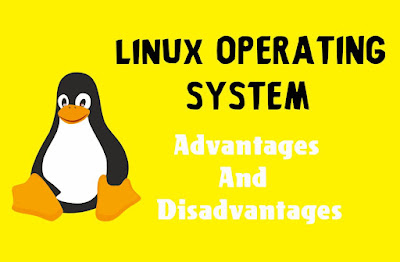alternative to MacOS and Windows. Even though Linux operating system is not so much popular today still it is preferred by programmer and IT administrators.
In this article, I will be discussing about the 5 Advantages and Disadvantages of Linux Operating System | Drawbacks & Benefits of Linux Operating System. Through this post, you will know the pros and cons of using Linux operating system.
Let's get started,
Advantages of Linux Operating System
1. Cost
Linux operating system comes with General Public License (GPL). Different from windows it does not require any licenses. So the OS is free to use. Even some of the softwares are entirely free on Linux. This makes Linux highly cost effective. You can find good windows alternative programs in the software manager.
2. Security
On default, Linux is designed to be secure. Unlike Windows, Linux is not much exposed to viruses. On very rare occasions, Linux is virus affected. That is the reason why Linux users do not normally install an Antivirus software. And also hackers are not very interested in Linux due to its low market share. Even if it is, they cannot easily hijack the system since there are locks on each layers.
3. Source Code
Linux is an operating system which is of open source base. Which means that the code is free to modify. Users can easily change the code based on their needs. Thus, you can customize your own personal operating system. However, you will need to have the appropriate programming knowledge.
4. System Requirements
Linux OS can even run on systems with low specifications. It is not very resource intensive like windows operating system. All the components like memory, diskspace and CPU are lower in this OS. So you do not need to upgrade your existing hardware for existing hardware for installing this OS. This is a fact that makes Linux a greater choice for all systems.
5. System Updates
Linux is also a step forward in terms of system updates. Frequently, the Linux OS releases system updates. In the case of upgrading your OS, you can do this without deleting your existing software. And the updates are hassle free when it comes to installation. It won't take much time if you need to update the system. Moreover, these updates normally do not crash your system.
Disadvantages of Linux Operating System
1. Adaptation
For people who are less expertise in computers it can be hard to understand Linux. Most users find it difficult to adopt to Linux due to the terminals used. Terminals are command line interface where you need to enter specific command in order to complete tasks. Furthermore, the level of difficulty varies according to the distribution used. For distributions like Arch, learning to use Linux becomes even more difficult.
2. Software Compatibility
Popular applications which are made for Windows and Mac are not available for Linux. Many developers are not interested in making softwares for Linux due to its small market value. Some of such softwares are MS Office, iTunes and Photoshop. Even though there are alternatives to these softwares, they cannot match up to the original level.
3. Gaming
Similar to sofwares, games too doesn't natively support Linux. Because Linux is not a platform which is not widely used, gaming developers are not much interested in Linux. So you cannot expect your favorite game to run on Linux. However, the number of games developed for Linux is on a rise in the recent years. Al though you can use third party softwares like Steam to download any gaming title, still the game will not run smoothly as it does on native operating system.
4. Hardware Compatibility
Almost all the hardwares can be connected to a Linux operating system. But the problem comes with the drivers. The concept of drivers in Linux is very different from other operating system. The drivers here are inbuilt inside the Kernel. Since the drivers are already preinstalled, the newly connected hardware device may not have the proper drivers. This makes the connected hardware device to be incompatible.
5. Technical Support
Since Linux is an open source operating system it lacks on the side of technical support. The problem cannot be rectified unless you find a solution yourself. For each problem users need to look online ; possibly a community forum. This cannot guarantee to have the exact problem which you experience. Apart from these, it is also difficult to find someone expert in Linux. Otherwise, once you encounter a problem you will have to look for other Linux distributions.










No comments:
Post a Comment